|
|
|
Sort Order |
|
|
|
Items / Page
|
|
|
|
|
|
|
| Srl | Item |
| 1 |
ID:
100326
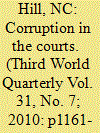

|
|
|
|
|
| Publication |
2010.
|
| Summary/Abstract |
The exponential growth in the size of the private security sector (PSS) in Africa has helped give the issue of its regulation new importance. Yet the ongoing debates over what laws should be passed and by whom tend to ignore the more basic and arguably urgent question of whether African states' justice systems are sufficiently robust to give this legislation meaning. The aim of this paper is to cast some much needed light on this topic by drawing lessons from Nigeria's current experiences. By tracing the development of its PSS code and examining instances of malpractice in its justice system, the article argues that its regulatory framework is fundamentally compromised by corruption.
|
|
|
|
|
|
|
|
|
|
|
|
|
|
|
|
| 2 |
ID:
100318
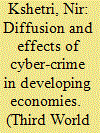

|
|
|
|
|
| Publication |
2010.
|
| Summary/Abstract |
Cyber-crime's footprints across the developing world are getting bigger. The aim of this article is to examine the structure of cyber-crimes in developing economies. Its central idea is that economic and institutional factors facing cyber-criminals and potential victims in the developing world are different from those in the developed world. In economies characterised by low internet penetration rates and few resources devoted to fighting cyber-crimes, formal institutions related to such crimes tend to be thin and dysfunctional. A cyber-criminal is less likely to be stigmatised in such economies. Moreover, organisations' and individuals' technological and behavioural defence mechanisms are likely to be weaker. Many people in developing economies are also attracted into cyber-crime because of high unemployment and low wages.
|
|
|
|
|
|
|
|
|
|
|
|
|
|
|
|
| 3 |
ID:
100328
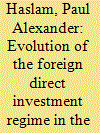

|
|
|
|
|
| Publication |
2010.
|
| Summary/Abstract |
The purpose of this article is to describe the international regime governing foreign direct investment in the Americas and assess its implications for regional economic governance. The article develops a novel methodology to map the multi-layered patchwork of investment agreements according to the level of investment protection offered by each agreement. The mapping exercise demonstrates the existence of two distinct legalization projects in the Americas, one which broadly corresponds to the investment protection concerns of the United States, and a second, overlapping regime, which better reflects the interest of many Latin American governments in maintaining their policy autonomy. The article argues that these distinct visions are anchored in a common dispute settlement system based on binding international arbitration, which tends to harmonize the governance effects of the regime.
|
|
|
|
|
|
|
|
|
|
|
|
|
|
|
|
| 4 |
ID:
100319
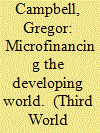

|
|
|
|
|
| Publication |
2010.
|
| Summary/Abstract |
Co-finance has steadily grown to provide credit to hundreds of thousands of individuals living in third world countries. The spreading of and innovation within the microfinance sector demonstrates a successful neoliberal initiative that is both socially conscious and economically beneficial. By connecting groups of poor individuals to lending institutions or affluent individuals in developed countries, microloans have been able to foster the strengthening of local economies, necessary for consuming life-improving technology, while incurring minimal risk to the lending party. Criticisms of microfinance-both non-profit and for-profit models-appear misguided as there are clear data demonstrating both a low incidence of default and modest interest rates. Moreover, credit has been the foundation for modern economic growth. Ethical lending to the Third World should therefore not be denied, but rather intensified through the faculty of microfinance.
|
|
|
|
|
|
|
|
|
|
|
|
|
|
|
|
| 5 |
ID:
100325
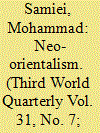

|
|
|
|
|
| Publication |
2010.
|
| Summary/Abstract |
Orientalism, as Edward Said used the term, can be defined as an ideology which promotes the 'West-and-Islam' dualism and the idea that 'Others are less human'. Since Said first published his ideas in 1978, however, the world seems to have become much more interdependent and political interrelations between the West and Islam have changed dramatically. Consequently this dualism, though more or less in place, has been influenced by escalating waves of globalisation and redistributed and reshaped in a different form. Some promising changes, as well as some additional dualistic tendencies, that can define neo-Orientalism are found in this new era. This paper attempts to analyse elements of change in traditional Orientalism. To portray a better future for our interdependent world some new approaches to identity, global ethics and global civil society are suggested. Eradicating the roots of Orientalism and Occidentalism alike and accepting, protecting and even promoting diversity are first steps towards countering the devastating threats that endanger humankind as a whole.
|
|
|
|
|
|
|
|
|
|
|
|
|
|
|
|
| 6 |
ID:
100323


|
|
|
|
|
| Publication |
2010.
|
| Summary/Abstract |
This article examines an emerging approach, called 'reconstruction from below', and its growing body of practice. The article argues that interventions for post-war reconstruction increasingly espouse a commitment to be bottom-up and contextually relevant, to look beyond state institutions, and to provide space for local ownership. The article traces the emergence of this approach to six factors present in international policy. It then examines the growing body of practice in the domains of livelihoods, institution building and basic service provision. It concludes that this approach is not the magic bullet that agencies seem to expect. Reconstruction from below rests on many untested assumptions. Programmes formed pursuant to these notions are often poorly adapted to the challenges encountered and hampered by mistrust of the local institutions to which this approach rhetorically entrusts reconstruction. The large and growing body of evolving experience suggests that it is time to take stock and learn lessons about how reconstruction from below functions in practice.
|
|
|
|
|
|
|
|
|
|
|
|
|
|
|
|
| 7 |
ID:
100321
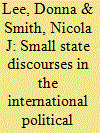

|
|
|
|
|
| Publication |
2010.
|
| Summary/Abstract |
This article supports growing calls to 'take small states seriously' in the international political economy but questions prevailing interpretations that 'smallness' entails inherent qualities that create unique constraints on, and opportunities for, small states. Instead, we argue that discourses surrounding the 'inherent vulnerability' of small states, especially developing and less-developed states, may produce the very outcomes that are attributed to state size itself. By presenting small states as a problem to be solved, vulnerability discourses divert attention away from the existence of unequal power structures that, far from being the natural result of smallness, are in fact contingent and politically contested. The article then explores these themes empirically through discussion of small developing and less-developed states in the Commonwealth and the World Trade Organization (WTO), considering in particular how smallness has variously been articulated in terms of what small states either cannot or will not do.
|
|
|
|
|
|
|
|
|
|
|
|
|
|
|
|
| 8 |
ID:
100330
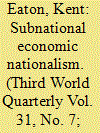

|
|
|
|
|
| Publication |
2010.
|
| Summary/Abstract |
Across the third world, transnational corporations (TNCs) and subnational governments (SNGs) are coming into new forms of contact as a result of liberalization and decentralization. Despite scholarly expectations that subnational governments will respond by seeking out foreign direct investment, in much of Latin America these governments are confronting rather than courting transnational corporations. Conceptualizing this phenomenon as 'subnational economic nationalism', the article explores both how subnational governments are challenging neoliberalism and why these challenges often fail to subvert neoliberal outcomes. By examining two struggles against transnational capital that had different outcomes but that took place within a single subnational jurisdiction (Arequipa, Peru), the article argues that decentralization can work at cross purposes. While voters are increasingly demanding that elected subnational officials adopt nationalist positions vis-agrave-vis TNCs, these same officials often seek financial support from TNCs so that they can compete successfully in the subnational elections that have been introduced by political decentralization.
|
|
|
|
|
|
|
|
|
|
|
|
|
|
|
|
| 9 |
ID:
100316
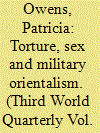

|
|
|
|
|
| Publication |
2010.
|
| Summary/Abstract |
This article revisits the debate about recent American torture practices, particularly the use of discredited anthropological texts to validate long-held Orientalist assumptions about the sexual vulnerability of Muslim males. Such practices are placed in an historical context of older imperial constructions of sexually deviant Muslims as well as of more general forms of gendered and sexual subordination required for war. American torturers intended to produce very particular objects of torture-ones willing and able to confess their 'true' orientation in terms of a binary hetero/homo sexual code established in 19th-century Europe. The torturers had the power to confirm through confession and re-enactment their crude assumptions, irrespective of the actual sexualities of those being tortured, with consequences for the transnational and reactionary politics of sexual identity.
|
|
|
|
|
|
|
|
|
|
|
|
|
|
|
|
|
|
|
|
|